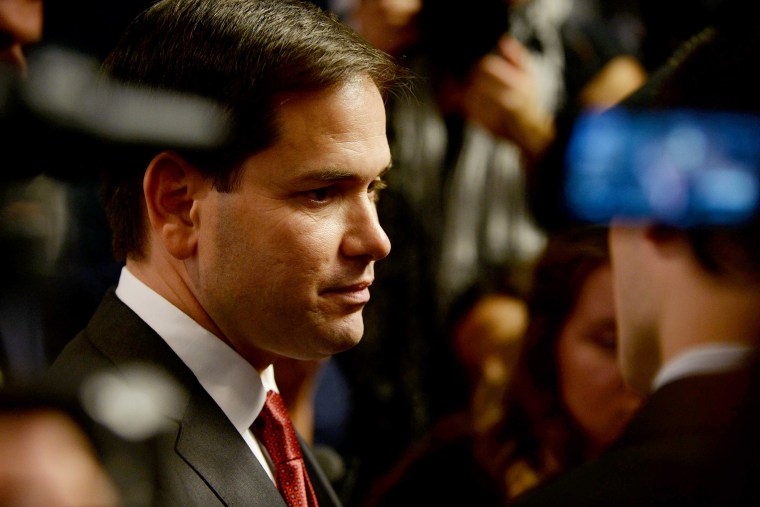At first blush, it's tempting to see Marco Rubio's economic plan as a dog-bites-man story: Republican presidential campaign proposes massive tax breaks for millionaires and billionaires, even while saying the opposite. The Florida senator isn't alone on this front, and it all seems sadly predictable.
But in this case, there's more to it. Even if you're unmoved by Rubio's odd inability to handle his own personal finances in a responsible way, the way he intends to deal with the nation's finances as president is arguably a national disqualifier.
The trouble started in earnest at the last debate for Republicans presidential candidates -- the one pundits decided was a triumph for Rubio -- when CNBC's John Harwood pressed the Florida senator on his tax-cut plan.
HARWOOD: The Tax Foundation, which was alluded to earlier, scored your tax plan and concluded that you give nearly twice as much of a gain in after-tax income to the top 1 percent as to people in the middle of the income scale. Since you’re the champion of Americans living paycheck-to- paycheck, don’t you have that backward? RUBIO: No, that’s -- you’re wrong.
It turns out, analysis from both the left and right scrutinized Rubio's plan and found that he was completely wrong. I can't say whether he was deliberately trying to deceive viewers or simply unaware of the details of his own policy, but in either case, the senator's claims were false.
In the days that followed, scrutiny of Rubio's plan intensified. Vox's Dylan Matthews talked directly to Rubio staffers and discovered that the senator's plan includes even more generous tax breaks for the top 1% than Jeb Bush's and Donald Trump's plans. An analysis for Citizens for Tax Justice also found that the bulk of the benefits in the Rubio plan would go to the very, very wealthy.
Indeed, New York's Jon Chait added, "Rubio’s proposal deliberately provides some benefits to Americans of modest income, which means that its enormous tax cuts for the very rich come alongside some pretty decent-size tax cuts for the rest of us. All told, Rubio’s plan would reduce federal revenue by $11.8 trillion over the next decade. The entire Bush tax cuts cost about $3.4 trillion over a decade, making the Rubio tax cuts more than three times as costly."
It's against this backdrop that Rubio has also proposed a vast expansion of the U.S. military, while leaving Social Security and Medicare benefits for current retirees untouched.
In any version of reality in which arithmetic exists, Rubio's plan is simply indefensible. Massive tax breaks for the rich, coupled with significant increases in military spending, leads to ballooning budget deficits. It's not theoretical -- we tried this in the Bush/Cheney era and it led to predictable results that we're still trying to address.
The difference is, Rubio wants tax cuts that are triple the size of the ones created by George W. Bush and Dick "Deficits Don't Matter" Cheney.
As this relates to the 2016 race, the central problem relates to policy: Rubio's numbers don't, and can't, add up. Anyone with access to a calculator should recognize just what a joke this scheme is.
But the other problem is what we're learning about Rubio as a candidate. There is, like it or not, a character aspect to presidential hopefuls' platforms -- because they offer Americans an opportunity to learn about candidates' honesty, priorities, values, and candor. The Florida senator who talks about his ability to appeal to maids and bartenders has gone to almost comical lengths to craft a plan that benefits CEOs and hedge-fund managers, all while pretending to be an expert on fiscal responsibility.
Marco Rubio's economic plan tells us something important about his candidacy, and it's not flattering.
